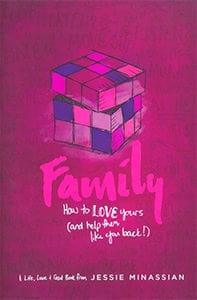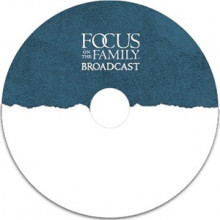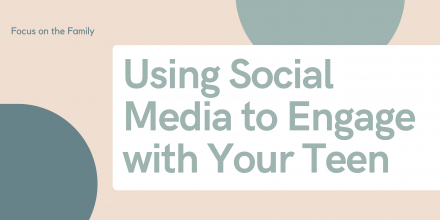Preview:
Jessie Minassian: … and in my mind, in the universe where everything and everyone revolved around me, my dad was at the center of most of the conflict, my stepdad. Um, it seemed like he was unreasonable, that I couldn’t do anything right, that he was always angry, and I was just done. And so I decided I was gonna run away, at least I thought I would. And so I started stuffing my backpack with various, uh, sundry items like the $10 dollars I had-
End of Preview
Jim Daly: (laughs)
Jessie: … ’cause that was gonna help.
Jim: That’d go a long way.
Jessie: Uh, right?
John Fuller: That’s Jessie Minassian describing just some of the challenges that teens face within the family, uh, in the context of relationships. And as a parent, I’m sure you’ve observed, uh, some of that teenage angst in your home, or hang on, it’s coming.
Jim: (laughs)
John: Uh, Jessie is back with us today on Focus on The Family, and your host is Focus president and author Jim Daly. I’m John Fuller.
Jim: John, last time we had a great conversation with Jessie about family dynamics, as you mentioned, and how parents and teens can kinda better navigate, uh, these issues like independence and bad attitude, and, uh, maybe the imperfect reality of family life. Uh, you know, so often, we expect perfection, and you’re not gonna get that. You’re gonna have something on a continuum that’s good to poor. Uh, perfection, I don’t think is on that continuum. Uh, these problems happen. It’s that rebelliousness and, uh, you know, the gentle stuff. This is a program for that family 101. It’s not where you have serious, um, and possible, uh, disorders that you might be dealing with. And I would encourage you if you’re questioning if you do, if your teen is in a place that’s more at risk in terms of their behavior, call us, and we’ll, we’ll go deeper with you in that regard. And we have programs and resources that can help in that space. But for this, this is just the normal stuff where we all giggle about teen, uh, attitude and parent attitude. And if you missed the program last time, I’d get it. It was so fun, and Jessie was so vulnerable with us. I think we were pretty vulnerable, too, John (laughs). But that’s where life is at, and we all have, at this table, we all have teen kids.
John: Mm-hmm.
Jim: And, uh, I think we’re living the dream right now.
John: And you can get an audio copy of our conversation with Jessie or look for the YouTube version. And also make sure you get a copy of her great book, Family: How to Love Yours (and Help Them Like You Back). Um, not love you back, necessarily, just like you back. Swing by our website to get started. It’s focusonthefamily.com/broadcast, or give us a call, 800, the letter A, and the word FAMILY.
Jim: Uh, Jessie, welcome back to Focus.
Jessie: It is so good to be here with you guys.
Jim: It was so fun last time.
Jessie: (laughs)
Jim: And we just… I so enjoyed that. And very practical, that’s what I love about it. Uh, things that both parents and teens can do to help their relationship through these turbulent years. You know, one parent said to me, uh, a while back, and I really loved this, that they, they enjoyed every stage. And that’s my goal.
Jessie: Mm-hmm.
Jim: I wanna enjoy the toddler years, I wanna enjoy the terrible twos, I wanna enjoy the, those middle years of six, seven-
Jessie: Hmm.
Jim: … eight. Oh, how those years are so nice (laughs). “Daddy, you’re awesome, daddy. We love you, daddy.” And-
Jessie: (laughs) [inaudible].
Jim: … then you get into adolescence, and then the teen years. But they can be very enjoyable years. You connect in a different way, uh, but it doesn’t have to be a downer. There probably will be more tension, more independence, more conversation around, “I need more space, dad. Won’t you trust me?” “Well, maybe until you do something I, I can’t trust you for,” right?
Jessie: (laughs)
Jim: And we covered all those topics last time. Um, let’s get back at it. Uh, communication and conflict is kind of core, and you covered that in your wonderful book, Family: How to Love Yours (and Help Them Like You Back), which I so enjoy that title (laughs). Um, that communication and conflict can be challenging, um, in every household. So how do we go about, um, knowing we’re sinful human beings, how do we, in fact, understand our teens a little better? There’s gonna be some unhealthy habits, uh, whatever they might be, and moms and dads are going, “Yup, yup. That’s my teen.” Just fill in the blank, right? Um, but how do we, how do we get started in helping to correct some of that behavior in a way that’s constructive, not deconstructive or destructive?
Jessie: Hmm. Yeah, absolutely. I think, I think we better preface this whole episode (laughs) first by saying I’m so thankful for your grace and the collective grace from listeners, because this is not something that I am great at either (laughs) of that conflict-
Jim: Well, that’s the truth of all-
Jessie: Right?
Jim: … experts.
Jessie: Oh, goodness.
Jim: I mean-
Jessie: It’s so true.
Jim: Yeah.
Jessie: So true. I mean, we’re right in the trenches with this, too, in trying to figure out. I mean, I confess in the book that I, this is not something I’m super proud of-
Jim: (laughs)
Jessie: … but I tend to be a thrower. Like, there are very few things that can get me that mad at-
Jim: What does that look like exactly?
Jessie: Well-
Jim: (laughs)
Jessie: … let’s talk about this (laughs). I’m probably need some counseling on this. No, I’m doing a lot better. I haven’t thrown anything in a very long-ish-
Jim: Are they spongy things-
Jessie: … time.
Jim: … or hard-
Jessie: No, like-
Jim: … hard surface?
Jessie: … a pot of oatmeal against the-
John: A pot of oatmeal?
Jessie: (laughs) I was pregnant.
Jim: Yeah.
Jessie: There were hormones involved.
Jim: (laughs)
John: (laughs)
Jessie: (laughs)
Jim: Excuses.
John: Oh, man.
Jessie: And then my cell phone one time, which I had to pay for, um, an open bag of chips, which went everywhere.
Jim: That one sounds fun, actually.
Jessie: And most shamefully, most shamefully, I was so mad one time, I threw God’s holy word at my husband (laughs).
Jim: Okay. Now we’re-
John: The bible.
Jim: Everybody’s going, “What?”
Jessie: I know, I know.
John: Oh, man.
Jim: But what’s going on there? I mean, you obviously are doing better. You said that.
Jessie: I, I am doing better. I’m grateful.
Jim: So what was the trigger?
Jessie: The trigger was family members who it… There’s something about living under the same roof with people 24 hours a day-
Jim: Drives you nuts? (laughs)
Jessie: … that knows how to push your buttons. Maybe just my husband and children know how to push my buttons, but it, it gets me to that point where my emotions just can feel out of control. And I’ve been learning through the power of the Holy Spirit how to give those to the Lord and try to stay calm and even, and live out those versus in Proverbs, a gentle answer turns away wrath. Um, a gentle answer also curbs my own wrath (laughs). So-
Jim: Right.
Jessie: … you know, I’m working on all of that, but this is, this is something that I’m still in process of, so I don’t wanna come across as I’ve got the perfect, you know, five-step solution. But I do think scripture is so able to point out how to do life well in every area, and that includes family conflict. So, um, we talk in my family about fighting fair. Like, fights are pretty inevitable. Conflict is inevitable, so-
Jim: Some people go, “No,” but it’s true. I mean, I think in a healthy situation, you’re gonna have disagreement.
Jessie: Disagreement at least. Disagreement, things that you don’t appreciate about another, things that rub you the wrong way, it doesn’t have to become all-out war. We can have a discussion or a fight that is constructive, where the end goal is a better understanding of each other, right? Communi- for communication to take place doesn’t mean that you have to agree with me, doesn’t mean that our kids have to agree that we are wise and all-knowing.
Jim: (laughs)
Jessie: But it means that we’ve communicated information and we come to a better understanding of each other. And I think if we have that foundation, then we can allow, um, family conflict to make us stronger as a family and as individuals.
Jim: Well, that’s half the battle is teaching your kids how to disagree in an appropriate way rather than with all the body language and the attitude-
Jessie: Yes.
Jim: We all give emotion. I mean-
John: A lot of emotion.
Jessie: We’re shutting down, [crosstalk] silent-
Jim: … ’cause they wanna win, you wanna win (laughs).
Jessie: Mm-hmm.
Jim: I mean, it’s just not the best of human-
Jessie: It’s so true.
Jim: … characteristics. You, in fact, use Proverbs 12 as a funny but guiding way to provide wisdom, particularly for teen girls. But you call it the, uh, foolish girl and the wise girl. So what in Proverbs 12 caught your attention in that regard? And you created a table, actually, that we’ll post online, and people can see this. But foolish girl and wise girl, Proverbs 12.
Jessie: And we will add to that. It’s not just foolish girl. It’s foolish parent and wise parent, as well.
Jim: Well, we don’t wanna add… No, no we don’t wanna post that one.
Jessie: (laughs) This is-
Jim: Okay, for all the teens listening, well post the foolish parent one.
Jessie: This is sort of a rubric.
John: It’s a two-way sword.
Jim: (laughs)
Jessie: This is the rubric for which I’ve-
Jim: I kind of avoided that, didn’t I?
Jessie: (laughs) Um, right. So I mean, all throughout Proverbs 12, we have really wise counsel for how to do communication well. And the foolish girl hates being told when she’s wrong. She gets trapped by a rebellious attitude, insists my way is right, and how often, as parents, do we insist that our ways is, are right?
Jim: Uh, pretty much every day.
Jessie: Right (laughs).
Jim: (laughs) It’s true.
Jessie: Hey, maybe I should think about this, ’cause my par- my kids are gonna listen to this podcast.
Jim: Yeah, yeah.
Jessie: They’re gonna be like, “See, mom. I told you, your way’s not always right.” Um, she gets irritated easily and lets everyone know when she’s mad. Um, she twists or exaggerates the truth, um, uses careless, mean words, plans ways to hurt others, um, and creates drama. And the, and the antithesis of that is someone who becomes wiser by the correction of others. And, I mean, it’s really easy for us to say, “Oh, our teens should become wiser for our correction,” but are we paying attention to the way that our kids are pointing out where we need to grow, even if it’s not in the most respectful way?
Jim: Hmm.
Jessie: Can we find that kernel of truth?
Jim: Yeah.
Jessie: Um, a wise girl or parent gets out of trouble with an honorable, cooperative attitude, listens and learns from others, let’s insults slide and doesn’t take others’ disagreements personally, always tells the truth in loving ways, uh, uses words to bless and heal others, and finds joy in spreading peace.
Jim: Wow.
Jessie: And that’s what I want to be said-
Jim: Yeah.
Jessie: … of my life in the way that I communicate with my family, um, rather than how many things mom threw. (laughs)
Jim: No, that… Yeah, the thrower. You know the one that catches me that I would think, um, people struggle with, but I think for the way God has created a woman, uh, they struggle, you struggle with this. I want you to confirm this or deny it, but let, let’s insult slide and doesn’t take others’ disagreement personally.
Jessie: Oh, gosh.
Jim: That’s gotta be a tough one.
Jessie: It’s really hard for men and women, I think. But yeah, I mean, to not take it personally, especially for moms, I think we, and without Christ’s intervention, so easily let our mothering become our identity. And so if anyone has anything critical to say, whether it be our husband or our children about our parenting style or what we’re doing, it’s very hard to disentangle that from our core.
Jim: Husbands are saying, “Amen.”
Jessie: (laughs)
Jim: I can hear it right now (laughs). Okay, I’m gonna get so much criticism from this, but folks, this is where there, you know, life is real, right? You also, uh, in your book, talk about that, that conflict journey. And as I was alluding to a few minutes ago, you have those eight, nine, 10-year-old years with your kids, and they’re just so kind to you, ’cause you can do no wrong, and you’re mommy and daddy, and I love you mommy and daddy.
Jessie: (laughs)
Jim: And you’re going, “This is awesome,” and then 11, 12, 13, and you start to feel that conflict. Um, talk about that dynamic, that change at that moment, because that’s probably where most of us, as parents, begin to blow it.
Jessie: Hmm.
Jim: We begin to fail, because it’s been relatively smooth and it’s been good, and we’ve done devotions together as a family, they have done the things we’ve wanted them to do when we generally ask them to do it. And now, it’s 13, 14, it’s a little more rebellion we might be seeing, uh, they’re not wanting to read together, they’re not wanting to study the Word together maybe, they have excuses, maybe even, you know, church is boring. “Mom and dad, come on. Can’t we do home church? Church is boring,” all those things that start to happen.
Jessie: Yeah.
Jim: How do we recognize that pattern, and what do we do to, I guess, keep them engaged?
Jessie: Yeah, yeah. Oh, I have so many thoughts on that.
Jim: Yeah (laughs).
Jessie: The first one being, I mean, uh, someone had told me early on, I’m so grateful for this analogy, that our goal as we’re parenting, you know, at first, we’re kind of leading. We’re up ahead. We’re kind of showing them the way to go. And then as they enter kinda those tween years, they’re coming up alongside us, and we’re kinda walking this thing together. And then as the teen years come, we’re actually kinda taking a step behind and kinda pushing them out in front of us and saying, “All right. You know the way. Now walk in it.”
Jim: And that’s a good thing to do.
Jessie: And that’s a good and healthy thing. But as parents, we’re having a really hard time with that. And I think part of it (laughs) I think part of it is the society that we’ve created. We think that kids are adults at 18, because they’re technically adults.
Jim: Right.
Jessie: And so we think that we have to parent intensively until they’re 18, and then all of a sudden, they’ll magically become adults and know how to do everything. I think we need to remember, I mean, 100 years ago, kids were pretty much adults at 13. You know?
Jim: Right.
Jessie: They were already going to work. It was, uh, they were done with school, um, and they’re capable of that. And so I think we’re seeing this push back from teens of wanting more independence because they should have more independence. They should be making more decisions. And moms, we are so guilty of helicopter parenting and lawn mower parenting, trying to clear the way in front of them, and, um, and we need to let them fail, let them try and fail, let them make some of those choices, and then take it with a grain of salt. Jim, I know you’ve said take the long view of parenting, and I couldn’t agree more. I mean, for me, I have lowered my standard of what I expect for my teens as they enter those years, um, from perfection down to I just want them to know that they’re loved, and I want them to know where to find Jesus.
Jim: Yeah.
Jessie: And to take a step back and realize they’re God’s kids, and they’re gonna have to make those decisions on whether to attend church, or they’re gonna have to make the decisions on what they’re gonna eat or where they’re gonna spend their money and who they’re gonna hang out with. And I’m not saying we shouldn’t be involved as parents at all, but I think the pendulum has, needs to swing more back to the middle and find that balance of letting them be adults before they leave our home.
Jim: Um, Jessie, in your book, you have some great advice for teens about their role as the older or younger sibling.
Jessie: Hmm.
Jim: Now, the sibling rivalry thing-
Jessie: (laughs)
Jim: … I don’t know if you guys are seeing that, but, man, I see it. And, uh, especially if their sizes. I’ve got a big first born, and a, you know, a, a modest second born. And those two go at it all the time. And that’s normal.
Jessie: That is normal.
Jim: But, uh-
Jessie: Oh, man.
Jim: … speak to that sibling rivalry and what older children need to know, what younger children need to know.
Jessie: When I was younger, my, I had three older brothers who they had their kind of pecking order all figured out. And so when I arrived as this new, fresh blood, I got the brunt of all of the torture, and there’s some pretty fun and embarrassing stories about how that played out. So I, I don’t expect that there’ll be always peace between brothers and sisters, but I do think that we need to hold our kids to higher standard, or they, they themselves-
Jim: Treat each other better.
Jessie: … to high standard, right?
Jim: Yeah.
Jessie: So for younger siblings, they have an excellent opportunity to have someone else go first. And there’s something to be said for being able to watch someone else live life and make decisions both good and bad, and get to watch that and decide, “Is that how I wanna live my life?” How’s that working out for that sister who decided to move in with her boyfriend, or how is that working out for my brother who is studying really hard so that he can get good grades? And then make their decision accordingly. And on the flip side for older siblings, you have an amazing responsibility and opportunity to live out 1Timothy 4:12, to be an example to the believers in your faith, in your purity and in your love and your faithfulness, all those things that we’re trying to grow in. Um, and I did not take that responsibility well when I was a teenager. I sort of tolerated my younger sister’s existence. She was seven years younger than I was, and because again, the world revolved around me, and it all orbited around my likes and dislikes, um, I wasn’t intentional about investing into her when I was in the home with her. And it’s one of the greatest regrets-
Jim: Hmm.
Jessie: … I have of my life. And so my encouragement for older siblings who are still in the home with their younger siblings is to take that responsibility seriously. You have such power and opportunity and influence to be able to shape a life, um, if you just take the time to do that.
John: Hmm.
Jim: But how often, we say, to the older sibling, “Hey, treat your younger brother better than you’re treating him. Come on.
Jessie: Mm-hmm.
Jim: Don’t speak to him that way.
Jessie: Yeah.
Jim: Uh, that’s not appropriate.” It’s almost like please and thank you.
Jessie: Hmm.
Jim: You sometimes have to say that, like, 1,000 times.
Jessie: (laughs)
Jim: Right? And you’re going, “Okay, for the one thousand tenth time, can you not speak to your younger brother-
Jessie: I know.
Jim: … that way?”
Jessie: That goes back to what we talked about yesterday, that we cannot be the Holy Spirit in our children’s lives, and it drives me nuts, because I say those words all the time, too, Jim. And-
Jim: Okay, that makes me feel better.
Jessie: … even though I know as an adult can look back and say, “Man, I really blew this amazing opportunity I had to be a good big sister.” I’m watching my two daughters now play this out in front of me, and it seems like even though I know all the right things, I’ve written books about this, I still am having a hard time getting to the heart of my kids to able to see the world outside of how it affects them.
Jim: Well, we have to remember, as parents, it’s planting those seeds, and then water-
Jessie: Mm-hmm.
Jim: … water, water.
Jessie: Yes. Yeah.
Jim: And sometimes, it’s a 100-year plant, right?
Jessie: Yeah.
Jim: Eventually, you’re gonna see that thing blossom-
Jessie: Yes, yeah.
Jim: … and you’re gonna hear a kind word said from one sibling to the other. And you’re gonna go, “Finally. Finally.”
Jessie: (laughs)
John: And to quote that parenting expert, Jim Daly, take the long view.
Jessie: (laughs)
Jim: That’s right.
Jessie: Yes.
John: Just last night, one of my daughters walked into the kitchen, and she called her older sister and said, “I’m gonna meet you at such and such coffee shop and talk.” And they had more time together last night than I had with them.
Jim: That’s a great thing.
Jessie: Wow.
Jim: Yeah.
John: And it really was, but 10 years ago, oh, man. This, I mean, the fireworks were flying.
Jim: Yeah.
John: So, uh, be encouraged, parents. Hey, this is Focus on The Family with Jim Daly. I’m John Fuller, and our guest today is Jessie Minassian, and we’re enjoying a conversation about, uh, teens, particularly teen girls. But, uh, encouragement to, uh, love your family as a teen as to, uh, receive their love back. Some great, practical help in Jessie’s book. Uh, get a copy of that and a CD of our conversation today at focusonthefamily.com/broadcast, or call us, and we’d be happy to send that out to you. Uh, Focus on The Family’s number is 800, the letter A, and the word FAMILY.
Jim: Jessie, you use a phrase in the book, mean mom syndrome. And I think I could almost say the mean dad syndrome, ’cause I know where this is going, but it’s not about the parents. It’s about the siblings.
Jessie: (laughs) Yeah.
Jim: And tell me that dynamic where the older sibling kinda takes on that role.
Jessie: Yeah, I think, I mean, part of it is good our kids are, are part of that healthy, growing up as imitating what they see in adults, and sometimes for good or for bad what they see in us, I think.
Jim: I call it becoming bossy.
Jessie: Yeah, right?
Jim: (laughs)
Jessie: (laughs) I’m trying to look at the positive first. No, yeah.
Jim: And that’s so good of you.
Jessie: So the, the, the problem is that, especially for girls, and I, I would imagine possibly for older boys, as well, for their, they kinda take on this, like, parental role-
Jim: Right.
Jessie: … thinking that it’s their job to, uh, get their younger siblings into shape. Um, uh, but for girls, I see a lot of this kinda mean mom syndrome.
Jim: (laughs)
Jessie: Like, at least I hope that that’s not how I sound-
Jim: The mean side of them, huh?
Jessie: … but when they take on that, because they don’t have the, you know, the age of, and wisdom that comes with age to be able to do it gently, they just come across as bossy and, and telling them what to do. And you should do this, you shouldn’t do this, and it’s kind of comical to watch sometimes, because they’re doing the exact same thing that they’re telling their younger siblings not to do. But I think, you know, unfortunately, some kids don’t have the luxury of having a parent in the home-
Jim: Yes.
Jessie: … who’s parenting well. And so this gets a little bit trickier. But I encourage girls and boys, you, you still can take out the mean part, even if you’re forced to take on a bit of a parental role, um, you can still do it in a kind and gentle way.
Jim: I’m thinking of those examples where, you know, my oldest is saying, “Hey, dad said you need to put your shoes over here.”
Jessie: Yeah (laughs).
Jim: And I’m sitting here thinking, “Yeah, but your shoes are over there.” It’s kinda like-
Jessie: Exactly (laughs).
Jim: … they got the concept, but they’re still not executing exactly right. You know?
Jessie: Oh, we hope they’ll get it before they have their own kids.
Jim: (laughs) And those poor younger siblings are just going, “All right, whatever.” You know, I so often see Troy just saying, “Yeah, okay. I got it.” He does it, and then I’m still looking at the older one going, “Come on. What about your shoes?” Um, you talk also about that relationship between dad and teen daughter.
Jessie: Hmm.
Jim: And there’s so many dynamics in that, and I think for a lot of us dads, not understood dynamics, not well enough.
Jessie: Yeah.
Jim: Um, we try to sometimes, I think, parent our daughters like we do our sons. And we recognize the differences, but it, it is a different tack that you need to take. Describe that. Um, you had, you know, had to build that with your stepfather. But describe the challenges there both from, uh, the dad’s perspective but also the teen girl’s perspective.
Jessie: Hmm. Uh, yeah. There’s so, so many things to pack in and out of that. And I really wanna make sure to touch on both sides, both for the dads to call you to a high standard of taking your responsibility with your daughter seriously, to understand that, that you are gonna be the first taste that she has of what it looks like to have someone love you unconditionally, to appreciate who you are, to tell you that you’re beautiful, to show you what it looks like to treat a woman well so that when she goes out and dates, she’s gonna know that this guy is not worth her time because he doesn’t treat her the way that you treated her. And on the flip side, I also wanna make sure that daughters know that you have the responsibility to let God fill up where your daddy’s gonna blow it-
Jim: Yeah.
Jessie: … because he is. He just is. He’s not perfect. He’s not your perfect daddy the way that God is. And so I’ve, I’ve had both. I, I, I feel like I, um, wish that, especially in those years when I was in the home, I with that there was more warmth from my father, more of a, of a connection there. Um, but I also watched the way that God filled up those holes left by not knowing my biological father and also by the struggles that I had, um, with my dad in the home. Um, he was so faithful to make sure that I wasn’t lacking anything.
Jim: Mm-hmm.
Jessie: Um, and to help me be confident, and all those things that, you know, we point to dads. I feel like there’s been a lot of talk in recent years about a dad’s role and how important that is, and I’m so thankful for that. But I don’t wanna put too much emphasis there, so that a dad doesn’t feel like he has to play God and make sure that his daughter is, you know, uh, understands her worth and her beauty and doesn’t go looking for the attention of boys, and it all rests on his shoulders or his daughter’s gonna become, you know, whatever. So-
Jim: You know what? Let me interject there, because I think one of the things, and we like simple, I mean, guys like simple, presence.
Jessie: Yes, yup.
Jim: A father just needs to be present.
Jessie: Yeah.
Jim: And I think if you can aim at that, just to be available, have those discussions, make time to-
Jessie: Yes.
Jim: … be able to just carve that time out. Maybe it’s 10, 15 minutes, it’s a walk around the block, but just let her know you care, and you know about her.
Jessie: Yeah.
Jim: That’s pretty simple.
Jessie: Yeah.
Jim: It’s not complicated.
Jessie: Yeah.
Jim: And that means you gotta put some things aside, maybe not do the work you planned on doing tonight, but just give her some of your time. And I think if you do that, your daughter will be generally pretty healthy.
Jessie: Absolutely, yeah. Yeah, I would agree with that. And again, it’s not, (laughs) unfortunately our children have this nasty little thing called free will. So you could-
Jim: Right.
Jessie: … do everything-
Jim: There’s not a formula.
Jessie: … perfectly, and it, and it may not have the-
Jim: Yeah.
Jessie: … impact that you hope it will. But I mean, there’s been plenty of studies that show that that presence and that warmth, that availability do go a very long way in her formation and her identity, and also in her, um, in her faith.
Jim: The other area here, and this will be it for today as we’re running out of time, but it’s a powerful story with your mom. You and I share that. We both lost our moms to cancer. Um, but we haven’t talked about the mom factor.
Jessie: Hmm.
Jim: Um, talk about your mom, what you learned in that setting, the fights you may have had-
Jessie: Hmm.
Jim: … but more importantly, the love you had for each other.
Jessie: Wow. My mom was the wisest and the best.
Jim: Hmm.
Jessie: I, I’m so grateful that she chose to keep me. I’m so grateful that she was brave enough to stick with a marriage that was very difficult for a lot of years. Um, I’m so grateful for her. The thing that I regret most is not the door slamming and the eye rolling in the years that I spent with her.
Jim: Hmm.
Jessie: The thing that I regret most is the apathy.
Jim: Yeah.
Jessie: And it, it really has fueled a desire in me to help families understand that change will come. We don’t know when it will happen. It could be slow, you know, of them leaving the nest and going off to make a life of their own, but you just don’t know how many days you have. And losing my mom, um, it’s been 10 years, now-
Jim: Yeah.
Jessie: … um, has changed how I live today. Life is no longer safe in the sense that I realize that I my, my stepdad and my in laws were mortal creatures.
Jim: Right.
Jessie: And, and Solomon in Ecclesiastics, he says, “It’s better to live in a, in a house of mourning than a house of pleasure.” Right? It’s better to go to the funeral than to the party-
Jim: Uh-huh
Jessie: … because it teaches us how to live today.
Jim: Right.
Jessie: It reminds us of, of our end, and it reminds us to live today with purpose and intentionality, and to make the most of the minutes and the hours and the days and the years that we have with our kids, with our parents, with our siblings, um, and to do life on purpose.
Jim: Well, that is well said. And that’s really the crux of your book, um, Family: How to Love Yours (and Help Them Like You Back). I think that is a perfect place to end. Um, have the long view and love each other, even through the tough stuff. You have touched our hearts today, Jessie.
Jessie: Thank you, Jim.
Jim: Thank you for your tenderness and for your stories. And to our listeners, if this conversation has sparked some questions or concerns about your own family, we’re here for you. Call us at Focus on The Family. We have many, many resources to help you at all different levels. I mean, at the top level, the 101, or the 404, you know, the deeper issues that you face. We wanna be there for you on matter what whether that’s the counseling team or just the book that can help you, steer and guide you in your way. Uh, we wanna encourage you and support you. So contact us today.
John: The number to call is 800-232-6459, 800, the letter A, and the word FAMILY, or stop by focusonthefamily.com/broadcast. And when you make a donation of any amount to the ministry today, either a one-time gift or a monthly pledge, we’ll say thank you for joining the support team by sending a copy of Jessie’s book to you. It’s called Family, and it’s a great resource. Coming up next time, sharing the truth in this day and age can be difficult, and Rod Dreher offers powerful stories of Christians who served God amid persecution.
Preview:
Rod Dreher: For a Christian, hope is that if you suffer faithfully for Jesus Christ and you’re willing to take whatever the world throws out at you, then you will triumph. The Lord with triumph through you sacrifice.
End of Preview
John: On behalf of Jim Daly and the entire team, thanks for joining us today for Focus on The Family. I’m John Fuller inviting you back as we once again help you and your family thrive in Christ.























